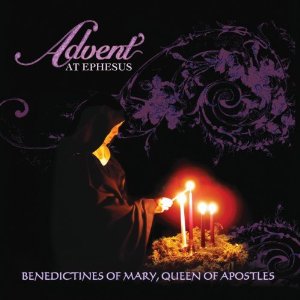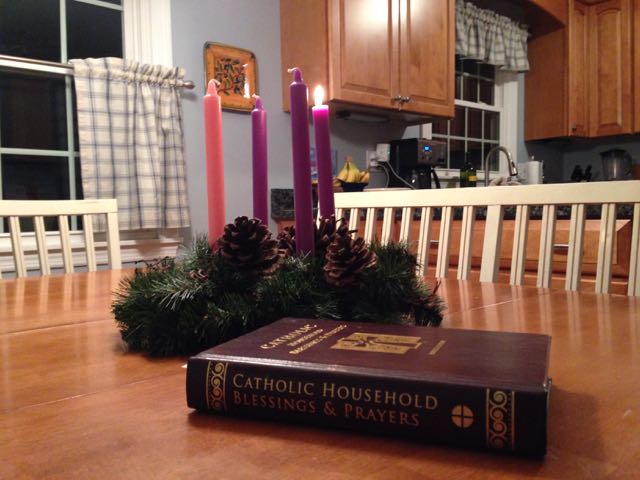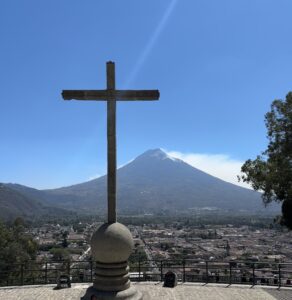Don’t let the frenzy of the season rob you of the chance to wait in wonder this Advent. Here’s my OSV Newsweekly story from last Advent to get you in the spirit:
By Mary DeTurris Poust
By the time Advent officially begins, most of us have been bombarded by so much Christmas music and Christmas advertising and Christmas everything that we’re already sick of the season. In a world where the Christmas countdown begins sometime before Halloween, it’s easy to lose sight of the beauty of Advent, and to get so caught up in the material trappings that we can’t see the spiritual forest for the tinsel-covered trees.
We live in a goal-oriented society, and in this case, Christmas is the end zone that we’re running toward at breakneck speed, hardly looking at what’s going on along the sidelines. But our faith beckons us to stop the madness, to stop the running, to focus on the journey as much as the destination. And to do that the Church gives us the four-week season of Advent, with its beautiful interplay of darkness and light, with its scriptural focus not only on the coming of the Christ Child but on the second coming of Jesus Christ, and with its quiet but constant insistence that we prepare — not just for a day but for a lifetime, and for the next life.
If we’ve been paying attention these past few months, we’ve been given some sound advice on how to do all this from Pope Francis, whose pastoral theme has been one focused on moving away from materialism and toward a deepening relationship with others and God.
“Brothers and sisters, let us call upon the name of Jesus,” Pope Francis challenged during his Nov. 3 Angelus address. “… And let us welcome him with joy: He can change us, can transform our hearts of stone into hearts of flesh, he can liberate us from selfishness and make our lives a gift of love.”
“Liberate us from selfishness.” Sounds like an Advent plan. So we start and end with Jesus, but how do we manage the days in between that are filled with things of a much less transcendent but somewhat necessary nature? It requires Herculean effort to silence the drumbeat of the secular version of this holiday and holy day. But by creating rituals and practices that refocus our attention on Jesus, we can bring some sanity, serenity and balance to the most difficult aspects of the season: the waiting, the buying and the praying amid the noise.
Waiting game
“Waiting is never easy, especially when we’re waiting for something as important and awesome as Christmas. Yet, the waiting itself is essential in properly preparing our hearts to welcome our Lord. If he just appeared suddenly — bing! Instant Savior! — then we wouldn’t have time for the prayer, meditation and contemplation that is required to reach the level of reverence that our hearts need and that he deserves,” said Marge Fenelon, author of “Waiting with Mary: Advent Reflections for Those Who Hate to Wait.”
“During Advent, the Church asks us to relive those weeks  before Mary gave birth to Jesus. No mother (not even foster or adoptive) welcomes a child out of the blue. There always is a period of preparation and anticipation. Advent is a time for us to imitate Mary’s pregnant motherhood — yes, even the guys — in that we await his birth in our hearts on Christmas morning. Savoring the waiting takes practice and determination,” she said. “To pull it off fruitfully, we need to focus on the waiting itself and how we’re approaching it spiritually. We need to plan spiritual exercises, customs, and quiet times that will lead us into, and hold us in, the attitude of holy expectation. If we don’t plan for a waiting-ful Advent, it won’t happen by itself.”
before Mary gave birth to Jesus. No mother (not even foster or adoptive) welcomes a child out of the blue. There always is a period of preparation and anticipation. Advent is a time for us to imitate Mary’s pregnant motherhood — yes, even the guys — in that we await his birth in our hearts on Christmas morning. Savoring the waiting takes practice and determination,” she said. “To pull it off fruitfully, we need to focus on the waiting itself and how we’re approaching it spiritually. We need to plan spiritual exercises, customs, and quiet times that will lead us into, and hold us in, the attitude of holy expectation. If we don’t plan for a waiting-ful Advent, it won’t happen by itself.”
Fortunately, the Church gives us a ready-made set of customs and exercises from which to choose. The Advent wreath is the most popular and familiar custom most Catholics use to mark the days of the season with prayer. But there are other opportunities to bring ritual and prayer into the season in ways that makes sense for you and your family. (See sidebar for Advent ideas.) Regardless of the method, the bottom line is prayer.
Everything is rooted in a prayerful watching and waiting. Fenelon, who says she wrote her book precisely because she lacks patience, told Our Sunday Visitor that prayer is essential if we’re going to try to slow down this season.
“Waiting is hard because we’re trained not to wait. Everything is instantaneous now — information, mental stimulation, recreation and even relationships. Digital technology puts it all right at our fingertips at a second’s notice … Prayer can’t be measured in gigabytes; it is measured in heartbeats. It’s also addictive. The more we pray, the more we feel the need to pray,” she said. “It can be a real struggle to reach the point of deeply fulfilling prayer when we’re feeling pressured by holiday preparations. We might not even feel like praying at all. That’s when we have to start with baby steps.”
Those baby steps can be something as simple as lighting a candle before dinner each night and stopping for just a minute to refocus attention on the sacred rhythm of the season, or it might be a conscious decision to avoid playing Christmas music or putting Christmas decorations up too early in the season. It’s not easy when “Jingle Bells” is playing from every radio station and when Santa is waving from every shopping center. But making an intentional effort to go against the grain will slow things down and allow you to savor the true beauty of Advent.
Consumerist culture
Perhaps nothing says Christmas like consumerism in mainstream America. We are living in a material world, and during the weeks and months leading up to Christmas, that fact is magnified to the point of the absurd. Gone are the days of handmade gifts and thoughtful trinkets. Now it’s not unusual for people to ask for gift cards, which is really just a polite way of saying, as Sally does in “A Charlie Brown Christmas,” “Just send money. How about tens and twenties?”
Quantity counts a little too much when it comes to Christmas these  days, a point that is driven home by the folks at Advent Conspiracy, an organization that strives to make people aware of the over-the-top spending that goes on in the name of Jesus and offers ways to reverse that.
days, a point that is driven home by the folks at Advent Conspiracy, an organization that strives to make people aware of the over-the-top spending that goes on in the name of Jesus and offers ways to reverse that.
In a video clip that went viral when it was first posted in 2006 — and which has done the same every year since — Advent Conspiracy points out that Americans spend $450 billion on Christmas every year, most of it on credit. That’s a lot of stuff, most of it unnecessary.
The video encourages people to give more of their time and their love and themselves, and less of their paycheck and watch the magic start to happen.
“I think people want a different way because they see all this stuff they’re buying is not doing it … We give people permission to relax, to enjoy the season and to push back on the tendencies they have to buy,” Tony Biaggne, creative director of Advent Conspiracy, told OSV.
Biaggne said people innocently try to fill the empty spaces in their lives with material things because that’s what the world tells us will make us happy. Advent Conspiracy started asking people to consider cutting back on even one gift and distributing that money to a good cause.
What happened was staggering. The group has raised millions of dollars for Living Water International, which works to end the “clean water crisis.”
But Biaggne is quick to mention that Advent Conspiracy is an “upside down charity.” It didn’t start out as an effort to raise money; it started as an effort to raise awareness of Jesus’ importance in our lives.
“We gave people a chance to focus on Jesus. The natural outflow is love, grace and mercy. It just happens,” he said. “People desperately are searching for a chance to truly connect with the God of the universe who truly does give them a sense of peace on earth.”
But that doesn’t mean forgoing gifts and taking on a Scrooge persona. Instead, the idea is not to stop giving gifts, but to give more intentional gifts, not necessarily handmade gifts but gifts from the heart.
Gifts from the heart
What does that look like in our modern world?
Well, it could be as simple as giving a child a “date” with mom or dad, a special day where they get to go somewhere or do something with a parent without interruptions or distractions like Facebook or work phone calls or TV.
Even gift cards can become heartfelt gifts when done right, said Biaggne.
“So if you give a gift card, you might say, ‘I know you love to shop at this store. The only catch is, I want to be with you and have lunch with you and shop with you,’” he said. “It becomes relational, and that redeems what seems like an empty gift.”
Biaggne is also quick to explain that Advent Conspiracy and other efforts to restore some sanity to the season cannot work without Jesus at the heart. He said that choosing not to include Jesus in a meaningful Christmas season is like choosing not to breathe oxygen when you take a breath. It can’t be done.
“You cannot enter into this without bringing your faith to the table and bringing Christ to the center of it and focusing on why the Christmas story matters,” he said. “It’s the most surreal, beautiful, most unexpected way that a Savior would enter into our world for all time.”
Change begins at home
So, for those of us just trying to balance the spiritual and the secular this season, how do we make it work?
“Forget trying to change the world and simply try to change your family,” said Al Kresta, president and CEO of Ave Maria Radio and author of “Dangers to the Faith: Recognizing Catholicism’s 21st Century Opponents” (OSV, $14.95). “You ask how Catholics can change. We won’t if we don’t recognize the seduction of consumerism. In spite of strong, even pointed, papal preaching, most Catholics still don’t feel that consumerism is much of a problem. It is, according to John Paul II, Benedict XVI and Pope Francis. Consumerism is the life orientation that our identities are formed by purchasing and consuming goods and services.”
Kresta told OSV that rather than scold others or society for the sad state of the Advent and Christmas season, do small things at home to make a difference where it counts — in the heart of your family.
That means, first and foremost, treating Advent as a season and an event separate from Christmas, rather than an extended shopping season.
“We sing Christmas carols all through Advent. We put Baby Jesus in our crèche scenes before the Nativity. Stop it. Don’t scold others about it. Stop it yourself and in your family. Try to enjoy the fact that our culture still has a way of recognizing the Incarnation, as inadequate a celebration as it is, and don’t be a scold. But be merrily different and when questions arise, enjoy making the point about Advent as a season of anticipation and the octave of Christmas as a season of thanksgiving,” he said. “One way to ensure that Advent will be a time of reflection rather than a time for commercial hype is to simply try and do as much Christmas shopping as possible the week before Advent begins. This requires more planning but I do know people who do and they exhort the rest of us to try. Advent, they say, has never been more meaningful.”
Biaggne from Advent Conspiracy also stressed the importance of doing small things that have the potential for big results. He suggested taking time to be silent now and then, saying that Psalm 46:10 — “Be still and know that I am God” – is his favorite go-to Scripture verse during the otherwise hectic season.

Advent at Ephesus by the Benedictines of Mary, Queen of Apostles, a beautiful soundtrack for the Advent season.
“I love that God is constantly trying to get us to shut up. Be quiet, not just physically, but turn off the buzzing in your head, turn off the quickening pace of your heart because of stress and know,” Biaggne said, adding that when we do that others pick up on the shift in us.
“They catch a whiff of grace. They notice we’re living differently, more at peace. ‘What’s your trick?’ they ask,” he said.
The answer is simple but not always welcome: Jesus, at the heart of Advent, at the heart of everyday life.
How does that translate into Advent action in Biaggne’s home?
He recalled how last year his 9-year-old son gave him a “date day” for Christmas. He made Biaggne his favorite pasta, served it up with sparkling grape juice, and asked his dad to talk about his life.
“It was a dinner I’ll never forget,” Biaggne said, reminding parents that their kids are not likely to remember the action figure or game they got years ago but the time you spent with them and the special rituals you created.
He recalled how his own father used to pick him up from his Catholic school to take him to a business club for Christmas lunch.“It wasn’t about what he gave me,” he said. “It was all about the time we spent together.”
Papal words, example
When we start to feel our spirits flagging as the push to conquer Christmas continues, we can look to Pope Francis for inspiration and guidance.
Although the message isn’t groundbreaking, he has put renewed emphasis on the dangers of materialism, a message that seems especially appropriate during this season of excess.
“Pope Francis perfectly follows the emphases of John Paul II and Benedict XVI on this matter of consumerism. The advantage that Pope Francis has is that he is living as close as possible to the very people he wants to reach and can better depict the immediate love of Jesus for the lonely, the poor and disabled. Like Jesus, he is with the people and by living with us he affirms our dignity and value,” said Kresta, who devotes a chapter to “Consumerism: Branding the Heart” in his book.
“To redeem means to buy us back from the slave market of sin. Consumerism sees redemption as a matter of coupon clipping or payment plans. It buys back products; Christ redeems persons. One of the purposes of the Incarnation is to break the bonds of consumerism,” Kresta explained. “Christ’s coming shatters its false scale of value so that we will no longer live enthralled by the impulses of the flesh, the seduction of the world or the manipulations of the devil. … We imitate the one who ‘though he was rich, yet became poor for our sakes’ (2 Cor 8:9). This strikes me as a particularly poignant theme for American Catholics to ponder during Advent.”
| Advent Practices |
|---|
|
The Advent wreath and the Advent calendar are classic traditions that keep Catholics focused on the “reason for the season,” but here some everyday Catholics offer ways they try to keep the spirit of Advent alive: Have everyone in the family go to confession during the Advent season. Cut up small pieces of yellow yarn or small pieces of cotton and each time someone does a good deed or acts like Jesus to someone else, he or she can place a piece in the crèche to prepare a soft place for the Baby Jesus.
Create an ‘Advent chain’ made of appropriate purple and pink paper strips to follow the liturgical colors of the season. Remove a link each day. Links can include a prayer, a Scripture quote or good deed. Celebrate St. Nicholas Day on Dec. 6 by leaving a token gift — an orange, a piece of chocolate — in each child’s shoe. Then talk about the real St. Nick. Participate in a giving tree or some other opportunity to adopt a family or child who will otherwise not receive any gifts this Christmas. Serve lunch at a local soup kitchen before you head to your family celebration.
Create your own Jesse tree with a branch from your yard and some handmade ornaments. Talk about the meaning behind each symbol. Turn your tree-trimming into a new tradition, either by chopping down your own tree or by blessing the tree as a family or by having a special dinner the night you decorate it. If possible, hold off on putting up the tree until the O Antiphons begin on Dec. 17, no easy feat in this rush-the-season world of ours. Help your children make gifts for their siblings, parents, grandparents and friends: pictures, stories, dates out, free baby-sitting. Let kids get creative.
|









